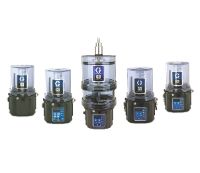How to avoid shock loading damage to your heavy-duty equipment
Automatic lubrication prevents shock loading damage to your earth-moving machinery.
When working with earth-moving equipment, you’ll occasionally hit the ground, a rock, the road, etc. During that hit, a shock load occurs on the pin and bushing of the bucket and boom, squeezing out the grease between the pin and the bushing. The way your machinery is lubricated determines the impact of these hits on your equipment.
If you work with heavy equipment, such as excavators, you’ll be keen to avoid unnecessary damage, expense, and dips in productivity. Shock loading can result in damaged equipment, diminished performance, and costly replacements.
What is shock loading?
When working with construction equipment, like an excavator, you occasionally hit the ground, a rock, earth, the road, etc. During the hit, a shock load occurs on the pin and bushing of the bucket and boom. During this shock load, grease between the pin and the bushing is squeezed out. This can cause the oil film to become very thin, and eventually wear out completely.
A worn-out oil film leads to metal-to-metal contact. During a shock load, the temperature in the point of a load increases heavily, possibly leading to microwelding in the metal-to-metal contact point. Repeated microwelding can cause the metal-to-metal contact point to be torn apart, leading to heavy wear and tear and high maintenance costs.
How to solve shock loading: lubrication
To avoid serious equipment damage, you must ensure fresh grease is delivered to the possible metal-to-metal contact points after a shock load.
There are two ways to lubricate the sensitive pins and bushing of your excavator:
- Manual lubrication
In case of manual lubrication, you must stop working to lubricate the boom of your equipment, resulting in undesired downtime. Because the pins and bushings are not easy to reach, manual lubrication is rather difficult. No wonder many operators choose to lubricate their machinery only once at the end of the working day. That means the pins and bushings are not properly lubricated during the moments of shock loading, leading to microwelding of the metal-to-metal contact points and unavoidable equipment damage.
- Automatic lubrication
With automatic lubrication, all the sensitive points of your heavy machinery boom are lubricated at fixed times (every half-hour, every hour…). This keeps the pins and bushings greased at all times, eliminating metal-to-metal contact. In case of a heavy shock load, you can press a button in the operator cabin to activate an extra lube event, guaranteeing a longer life for the pin and bushing.
Conclusion: Avoid high costs and extend equipment life with automatic lubrication
Manual lubrication doesn’t deliver the right amount of lubricant at the right time in the right place. Because operators have to stop working to manually lubricate the (often hard-to-reach) lubrication points, many postpone this action until the end of the working day. So, as time – and shock loading – goes on, more and more damage occurs to the bushing and the frame. An automatic lubrication system, on the other hand, consistently dispenses accurate doses of lubricant, extending equipment life, reducing maintenance and repair frequency, and minimizing downtime and costs.
Related Articles
Graco Lubrication Systems on Komatsu Equipment
Automatic lubrication system
How to avoid pin bushing wear and minimize repair costs
Auto Lube reduces contamination and wear of pin bushing, extend machine life and help avoid downtime.
What’s the return on investment (ROI) of an automatic lubrication system?
An automatic lubrication system provides many benefits, but how do you calculate its ROI?






